Did you know that chayote squash is not only delicious and versatile, but it also offers a wide range of health benefits? This often overlooked vegetable packs a formidable nutritional punch, making it a must-have in your kitchen. Whether you’re looking to improve your heart health, control your blood sugar levels, or simply enjoy a flavorful and nutritious meal, chayote squash has got you covered.
In this comprehensive guide, I will take you on a journey through the world of chayote squash, exploring its origins, nutritional profile, and the remarkable impact it can have on your well-being. You’ll learn about its role in promoting healthy aging, supporting liver health, and even its potential cancer-fighting properties. Get ready to dive into a world of culinary delight and discover the incredible benefits of this humble vegetable.
Key Takeaways:
- Chayote squash is a versatile and nutritious vegetable that offers a wide range of health benefits.
- It is low in calories, carbs, and fat, making it a great addition to a balanced diet.
- Chayote is rich in essential vitamins, minerals, and fiber that support various aspects of your health, including heart health, blood sugar control, and digestion.
- Adding chayote squash to your meals is a delicious and easy way to boost your nutrient intake and enjoy its unique taste and texture.
- Stay tuned to learn more about chayote recipes and creative ways to incorporate this versatile vegetable into your cooking.
What is Chayote Squash?
Chayote squash, also known as vegetable pear or mirliton, is a type of summer squash that grows on a climbing vine. It originated in Mesoamerica and has been cultivated since pre-Columbian times. Chayote is technically a fruit but is commonly used as a vegetable. It has a mild taste and crunchy texture. The scientific name for chayote squash is Sechium edule.
Chayote squash, with its vibrant green color and unique shape, is a popular ingredient in many dishes worldwide. Its versatility and nutritional profile make it a favorite among chefs and home cooks alike. Whether you’re looking to add a healthy twist to your salads or create a flavorful side dish, chayote squash is a fantastic choice.
One of the remarkable features of chayote squash is its ability to adapt to various cooking methods. It can be enjoyed raw or cooked, allowing you to experiment with different flavors and textures in your recipes. The mild taste of chayote makes it an excellent canvas for a variety of seasonings and spices, making every dish burst with flavor.
Growing and Harvesting Chayote Squash
Chayote squash is relatively easy to grow, especially in warm climates. It thrives in full sun and well-drained soil. The vine-like plant produces numerous fruits, which are typically harvested when young and tender. You can find chayote squash in local farmers’ markets or grow your own in a home garden.
Chayote squash is a versatile and nutritious vegetable that can be incorporated into a wide range of recipes. Its mild flavor and crunchy texture add depth and appeal to any dish, while its impressive nutritional profile provides various health benefits. Whether you’re a seasoned cook or a beginner in the kitchen, chayote squash is a delightful ingredient that will elevate your culinary creations.
Nutritional Profile of Chayote Squash
Chayote squash is a highly nutritious vegetable, packed with essential vitamins and minerals that contribute to overall health and well-being. Let’s take a closer look at the nutritional value of this versatile ingredient:
| Nutrient | Amount per 203g Serving |
|---|---|
| Calories | 39 |
| Carbohydrates | 9g |
| Protein | 1.7g |
| Fat | 0.3g |
| Fiber | 3.5g |
Chayote squash is particularly rich in several vital nutrients. It is an excellent source of vitamin B9 (folate), vitamin C, magnesium, calcium, and fiber. Folate is essential for cell growth and reproduction, while vitamin C boosts the immune system and helps the body absorb iron. Magnesium and calcium support bone health, and fiber aids in digestion and helps maintain a healthy weight. Additionally, chayote squash is low in sodium and sugars.
By incorporating chayote squash into your diet, you can enjoy its delicious taste while reaping the nutritional benefits it offers. Whether you prepare it in salads, soups, stews, or roasted dishes, chayote squash is a versatile ingredient that can enhance the nutritive value of your meals.
A Closer Look at Key Nutrients in Chayote Squash:
- Vitamin B9 (Folate): Chayote squash is an excellent source of folate, a B-vitamin crucial for DNA synthesis and repair. Folate is especially important during pregnancy for the proper development of the baby’s neural tube.
- Vitamin C: Chayote squash is rich in vitamin C, an antioxidant that helps protect cells from damage, supports the immune system, and assists in collagen production for healthy skin.
- Magnesium and Calcium: Chayote squash provides a good amount of magnesium and calcium, essential minerals for maintaining strong bones and teeth, proper muscle function, and nerve signaling.
- Fiber: Chayote squash contains dietary fiber, which aids digestion, promotes bowel regularity, and helps control blood sugar levels.
“Including chayote squash in your meals can be an excellent way to nourish your body with vital nutrients and support your overall health and well-being.”
Health Benefits of Chayote Squash
I’m excited to share with you the incredible health benefits that come with incorporating chayote squash into your diet. This versatile vegetable is not only delicious but also packed with essential nutrients.
Antioxidants to Combat Chronic Diseases
One of the standout qualities of chayote squash is its abundance of antioxidants. These powerful compounds help protect our cells from damage caused by free radicals, reducing the risk of chronic diseases such as heart disease and certain types of cancer.
“Including chayote in your meals can provide a natural defense against these illnesses,” says nutrition expert Dr. Jane Reynolds.
Vitamins and Minerals for Optimal Health
Chayote squash is a powerhouse of vitamins and minerals that contribute to overall well-being. It is particularly rich in vitamin C, an immune-boosting nutrient that aids in collagen production, supporting strong and healthy skin.
Additionally, the mineral content of chayote, including magnesium and calcium, promotes bone health and regulates muscle function. These essential nutrients also play a vital role in maintaining a healthy cardiovascular system.
Fiber for Digestive Health
If you’re looking to improve your digestive health, chayote squash is an excellent addition to your diet. With its high fiber content, chayote promotes regular bowel movements, prevents constipation, and supports a healthy gut.
“Fiber acts as a natural broom, sweeping away waste and toxins from the body,” explains registered dietitian Karen Harris. “Including chayote in your meals can help maintain a healthy digestive system.”
Managing Blood Pressure and Heart Health
Studies have shown that chayote squash may have a positive impact on blood pressure levels, making it beneficial for individuals with hypertension. The potassium content of chayote helps regulate blood pressure and maintain a healthy cardiovascular system.
Furthermore, chayote’s low sodium content and high fiber content contribute to reducing cholesterol levels, protecting against heart disease.
Supporting Blood Sugar Control
For individuals with diabetes or those concerned about blood sugar levels, chayote squash makes for an excellent dietary choice. Its low carbohydrate content and high fiber content slow down the digestion and absorption of carbohydrates, helping stabilize blood sugar levels.
“Chayote squash helps prevent spikes and crashes in blood sugar, providing consistent energy throughout the day,” says certified diabetes educator Laura Foster.
In addition, compounds found in chayote have been shown to improve insulin sensitivity, making it a valuable asset in managing blood sugar control.
Remember, always consult with your healthcare provider before making any significant changes to your diet, especially if you have any underlying health conditions.
Incorporating chayote squash into your meals can bring about a multitude of health benefits. Its high antioxidant content, along with essential vitamins, minerals, and fiber, supports overall well-being and helps protect against chronic diseases. Whether you enjoy chayote in salads, stews, or roasted as a side dish, this delicious and nutritious vegetable is a must-have in your kitchen.
Chayote Squash and Pregnancy
During pregnancy, maintaining a healthy diet is essential for both the mother and the developing baby. Chayote squash, with its numerous benefits and high nutritional value, can be a valuable addition to a pregnant woman’s diet.
One of the notable benefits of chayote squash is its rich folate content, which is crucial for proper fetal development. Folate plays a vital role in the formation of the baby’s brain and spinal cord, making it an essential nutrient during pregnancy.
Studies have also suggested that adequate folate intake may help prevent preterm births, reducing the risk of complications associated with preterm delivery. Including chayote and other folate-rich foods in a balanced diet can contribute to a healthy and successful pregnancy.
Additionally, chayote squash provides other essential nutrients that support overall maternal health during pregnancy. It is low in calories, making it a light and nutritious food choice. Chayote also contains important vitamins and minerals, such as vitamin C and potassium, which contribute to the mother’s well-being.
To enjoy the benefits of chayote squash during pregnancy, it can be incorporated into various dishes. Whether added to salads, soups, or stir-fries, chayote can enhance the nutritional value and taste of meals.
If you’re pregnant or planning to become pregnant, consult with your healthcare provider to ensure a well-rounded and balanced diet that includes the necessary nutrients for a healthy pregnancy.
Benefits of Chayote Squash for Pregnancy:
- High in folate, which supports proper fetal development
- Potential for preventing preterm births
- Low in calories and rich in essential vitamins and minerals
Including chayote squash as part of a balanced diet during pregnancy can contribute to a healthy and successful pregnancy journey.
Chayote Squash and Cancer
While more research is needed, studies have suggested that chayote squash may have anticancer effects. It contains antioxidants and plant compounds that have shown potential in slowing the growth and progression of cancer cells, particularly cervical cancer and leukemia cells. However, further studies are required to fully understand the anticancer properties of chayote.
Antioxidants found in chayote squash play a crucial role in protecting the body against oxidative stress. These compounds help neutralize harmful free radicals that can damage cells and DNA, potentially leading to the development of cancer.
“Chayote squash is rich in antioxidants and plant compounds that have been found to have anti-cancer properties. The presence of these compounds suggests that incorporating chayote squash into your diet may contribute to cancer prevention.”
Additionally, chayote squash contains various plant compounds that have shown promising results in laboratory studies. For example, one study found that chayote extract exhibited significant inhibition of cervical cancer cell growth and induced cell cycle arrest.
A study conducted on leukemia cells also showed that chayote extract had a cytotoxic effect, meaning it was capable of killing cancer cells. These findings indicate the potential of chayote squash as a natural source of chemopreventive agents.
However, it is important to note that these studies have been conducted in vitro or in animal models and may not directly translate to human outcomes. Further research, including clinical trials, is necessary to validate these preliminary findings and explore the full range of chayote’s anticancer properties.
Chayote Squash and Aging
As we age, it’s natural to be concerned about the visible signs of aging. The good news is that chayote squash may offer a helping hand in slowing down these signs. This versatile vegetable is packed with antioxidants, especially vitamin C, which plays a crucial role in maintaining youthful-looking skin and overall well-being.
Antioxidants are powerful compounds that protect our cells from damage caused by free radicals. These free radicals contribute to the aging process, leading to wrinkles, fine lines, and other undesirable effects on the skin. By consuming chayote squash, you can increase your intake of antioxidants and give your body the tools it needs to fight back against these age-accelerating free radicals.
Vitamin C, in particular, is essential for collagen production. Collagen is a protein that gives our skin structure and elasticity, helping to keep it firm and plump. As we age, collagen production naturally decreases, resulting in sagging and wrinkling of the skin. By including chayote squash in your diet, you provide your body with the necessary vitamin C to support collagen synthesis and maintain a youthful appearance.
While more research is needed to fully understand the specific effects of chayote on aging, its high antioxidant content, including vitamin C, makes it a promising addition to a healthy and anti-aging diet.
So why not incorporate chayote squash into your meals and enjoy its potential benefits for healthier aging? Whether eaten raw in salads, added to soups and stews, or roasted as a delicious side dish, chayote can be a versatile and nutritious ingredient that supports your overall well-being.
“Chayote squash, with its antioxidant-rich profile and vitamin C content, may contribute to healthier aging by protecting against the visible signs of aging and promoting a youthful appearance.”
Chayote Benefits for Aging
| Benefits | How it Helps |
|---|---|
| Protection against free radicals | Antioxidants in chayote squash help combat free radicals that contribute to aging. |
| Promotes collagen synthesis | Vitamin C in chayote supports collagen production for firm and youthful-looking skin. |
| Potential reduction of visible signs of aging | Regular consumption of chayote may help slow down the appearance of wrinkles and fine lines. |
Chayote Squash and Liver Health
Chayote squash offers several benefits for liver health. It has been found to protect against fat accumulation in the liver, making it potentially beneficial for individuals with fatty liver disease. Studies have shown that chayote extract can reduce cholesterol and fatty acid deposits in the liver, promoting better liver function and metabolism. However, more research is needed to fully understand the effects of chayote on liver health.
| Effect | Benefit |
|---|---|
| Reduces fat accumulation in the liver | Protects against fatty liver disease |
| Decreases cholesterol levels in the liver | Promotes better liver function |
| Improves overall liver metabolism | Supports healthy liver function |
Chayote Squash and Heart Health
When it comes to maintaining a healthy heart, chayote squash can be a valuable addition to your diet. This versatile vegetable offers several properties that support cardiovascular health, contributing to overall well-being.
One of the key benefits of chayote squash is its ability to improve blood flow and reduce blood pressure levels. The phytochemicals present in chayote promote healthy circulation, ensuring that oxygen and nutrients reach all parts of the body effectively.
Furthermore, chayote squash contains antioxidants, including myricetin, which have been shown to have a positive effect on cholesterol levels. By helping to lower cholesterol, chayote reduces the risk of heart disease and supports a healthier cardiovascular system.
Additionally, the antioxidants present in chayote contribute to reducing inflammation, which is a major factor in heart disease. By mitigating inflammation, chayote helps protect the heart and blood vessels from damage, promoting a stronger and healthier cardiovascular system.
Incorporating chayote squash into a balanced diet can have profound effects on heart health. Its numerous benefits, including improved blood flow, reduced blood pressure, lowered cholesterol levels, and decreased inflammation, make it an excellent choice for maintaining a healthy heart.
Key Points:
- Chayote squash supports heart health by improving blood flow and reducing blood pressure levels.
- It contains antioxidants that help lower cholesterol levels, reducing the risk of heart disease.
- The antioxidants in chayote also reduce inflammation, contributing to a healthier cardiovascular system.
- Including chayote squash in a balanced diet can support overall heart health.
Chayote Squash and Blood Sugar Control
When it comes to maintaining healthy blood sugar levels, chayote squash can be a valuable addition to your diet. This versatile vegetable is low in carbohydrates and high in fiber, making it an excellent choice for individuals looking to manage their blood sugar.
The soluble fiber found in chayote plays a crucial role in slowing down the digestion and absorption of carbohydrates. This helps prevent rapid spikes in blood sugar levels, promoting stability and balance. By incorporating chayote into your meals, you can support better blood sugar control and reduce the risk of blood sugar imbalances.
In addition to its fiber content, chayote contains certain compounds that may improve insulin sensitivity. Insulin sensitivity refers to the body’s ability to effectively utilize insulin, a hormone responsible for regulating blood sugar levels. Enhanced insulin sensitivity is particularly beneficial for individuals with type 2 diabetes or those at risk of developing the condition.
By incorporating chayote squash into your diet, you can take advantage of its blood sugar-stabilizing properties. Whether you include it in soups, stews, or roasted dishes, chayote offers a delicious and nutritious way to support your overall health and well-being.
Benefits of Chayote Squash for Blood Sugar Control:
- Low in carbohydrates and high in fiber
- Slows down carbohydrate digestion and absorption
- Stabilizes blood sugar levels
- Improves insulin sensitivity
By incorporating chayote squash into your diet, you can enjoy its blood sugar-balancing benefits while savoring its unique taste and texture. Make sure to consult with your healthcare provider or a registered dietitian for personalized advice on incorporating chayote into your diabetes management plan.
How to Enjoy Chayote Squash
Chayote squash is a highly versatile vegetable that can be enjoyed in a variety of ways. Whether you prefer it raw, cooked, or roasted, there are plenty of delicious chayote recipes to explore. Let’s take a look at some creative ways to incorporate this unique ingredient into your meals.
Raw Chayote in Salads
One simple and refreshing way to enjoy chayote is by adding it raw to salads. Slice the chayote into thin strips or cubes and toss it with your favorite greens, such as spinach or arugula. The mild flavor of chayote adds a crisp and crunchy texture to your salad, while its subtle taste complements other ingredients.
Chayote in Soups and Stews
Chayote squash can also be a delicious addition to soups and stews. Its tender texture lends itself well to simmering in flavorful broths. Whether you’re making a hearty vegetable soup or a comforting stew, consider adding diced chayote to enhance the taste and add some extra nutrients to your dish.
Roasted Chayote as a Side Dish
If you’re looking for a simple yet flavorful side dish, try roasting chayote. Cut the squash into wedges or cubes, toss it with some olive oil, and season it with your favorite herbs and spices. Roast it in the oven until tender and slightly caramelized. The result is a delectable side dish that pairs well with grilled meats or roasted vegetables.
Don’t be afraid to experiment with flavors and spices when cooking chayote. Its mild taste makes it a versatile canvas for various seasonings. You can try adding chili powder for a spicy kick or sprinkle it with some garlic powder for a savory twist.
There are numerous chayote recipes available online that showcase the vegetable’s unique taste and texture. From chayote soup to roasted chayote tacos, the possibilities are endless. Get creative in the kitchen and discover new ways to enjoy this versatile vegetable.
Try incorporating chayote into your cooking repertoire and discover the delightful flavors it has to offer. Whether you prefer it raw in salads, cooked in soups, or roasted as a side dish, chayote is a versatile ingredient that adds a unique touch to any meal.
Conclusion
Chayote squash is a truly remarkable vegetable with a wide range of health benefits. It is not only low in calories, carbs, and fat but also rich in essential vitamins, minerals, and fiber. Incorporating chayote into your diet can have a positive impact on your overall health and well-being.
One of the key advantages of chayote is its versatility. With its mild flavor and crunchy texture, chayote can be used in various recipes to create delicious meals. Whether you enjoy it raw in salads, add it to soups and stews, or roast it as a side dish, chayote adds a unique twist to your culinary creations.
By including chayote squash in your meals, you can support heart health, maintain healthy blood sugar levels, promote optimal digestion, and even contribute to healthier aging. This versatile vegetable is a wonderful addition to any diet and can be enjoyed by individuals of all ages.
So why not give chayote squash a try in your next recipe? Explore the numerous culinary possibilities and benefit from its exceptional taste and nutritional value. Discover the remarkable health benefits and the incredible flavors of chayote squash today!

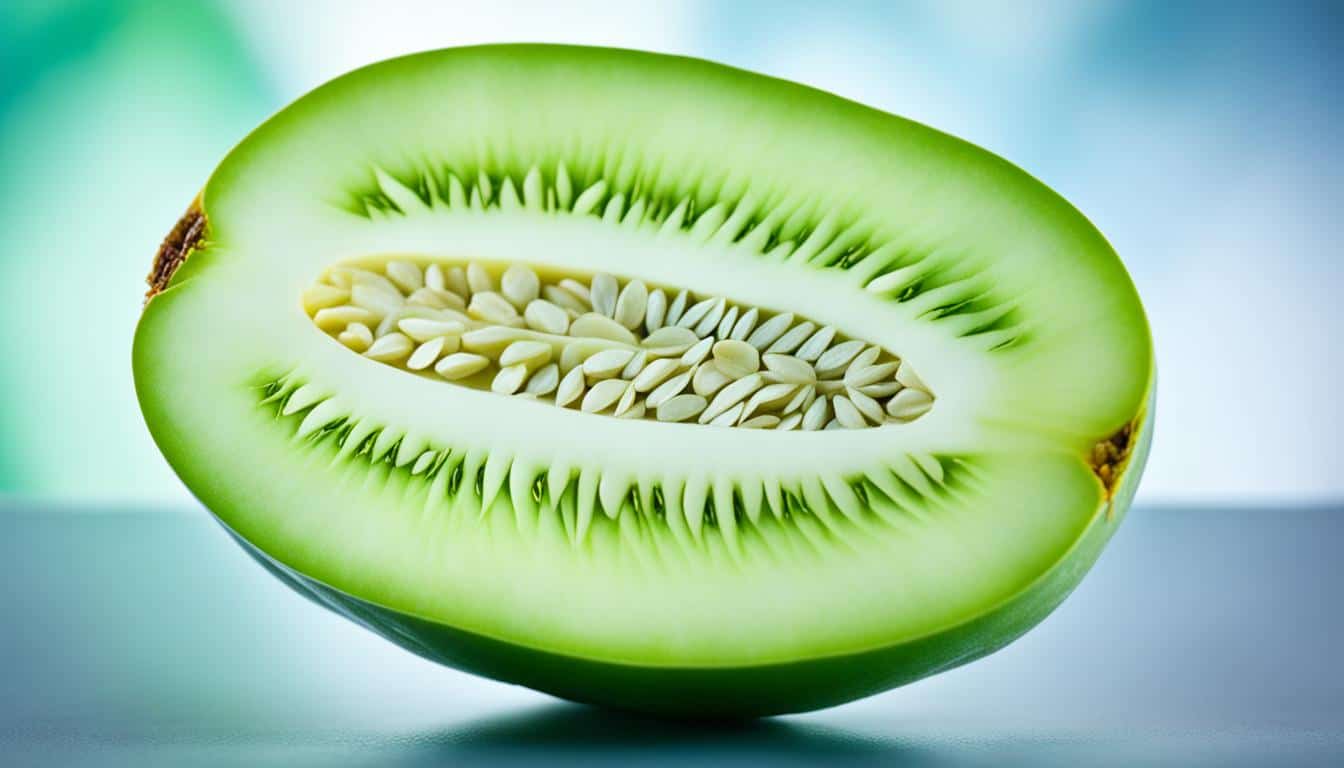
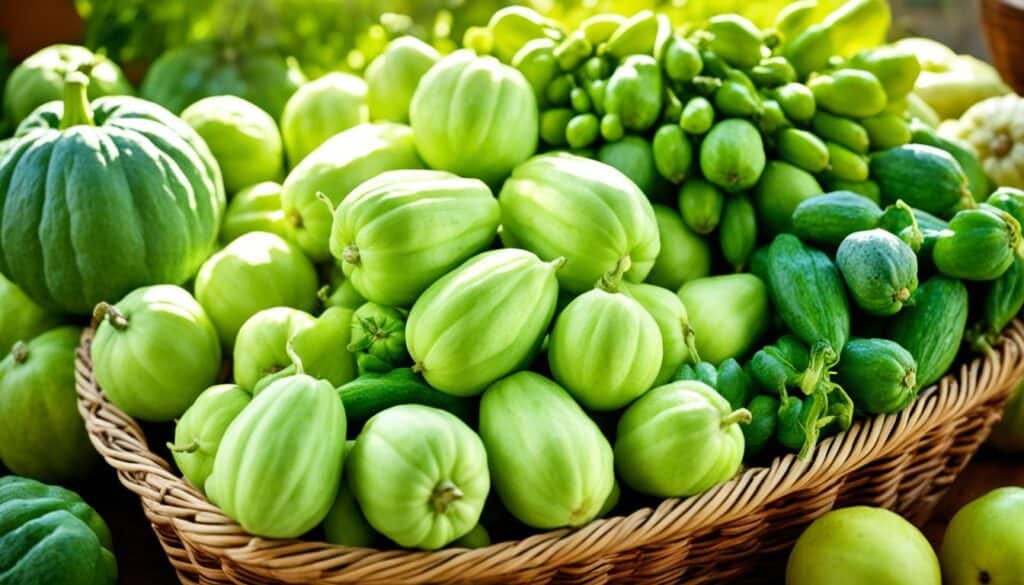
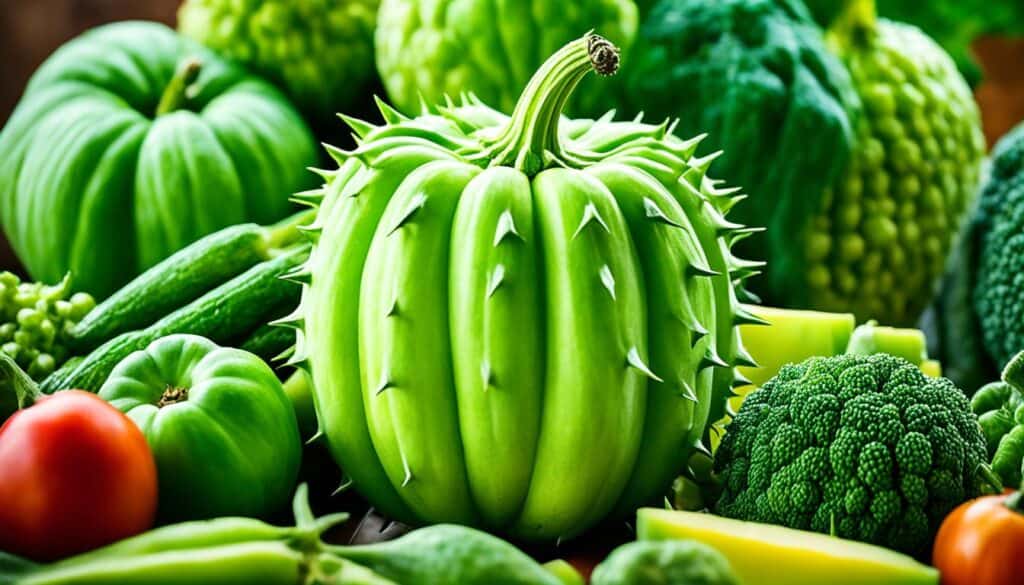

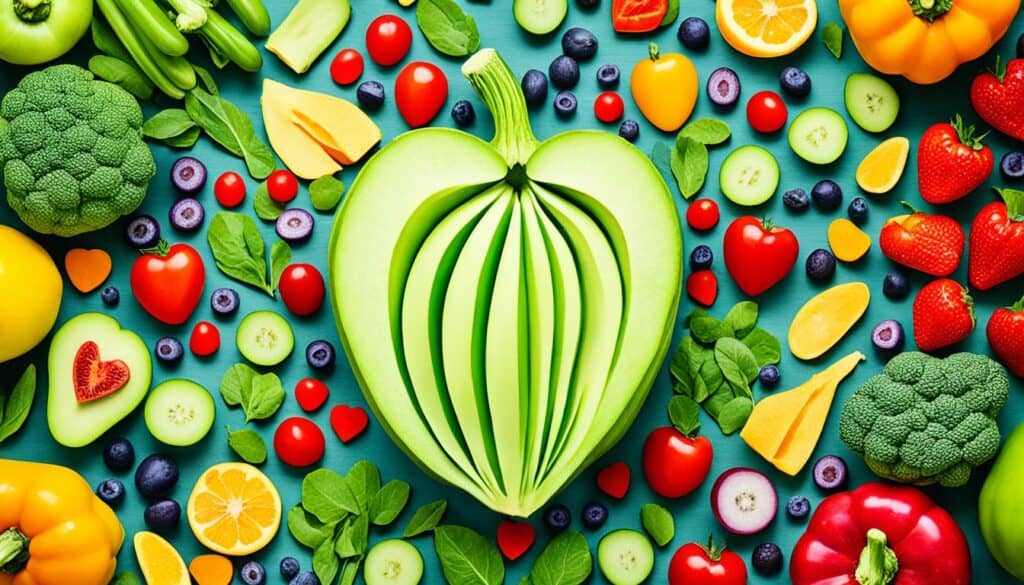
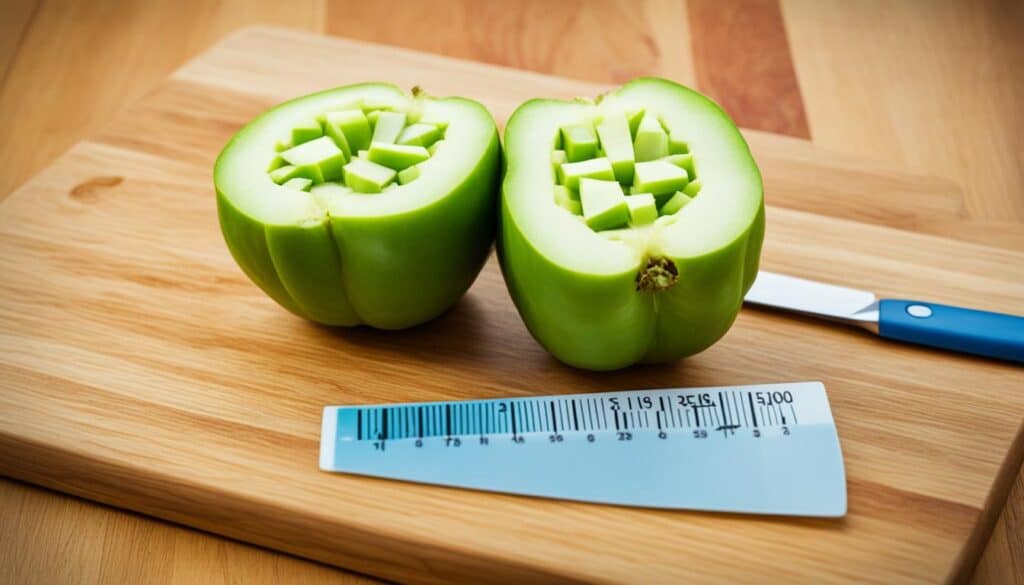



Leave a Reply